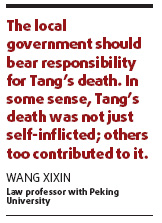Society
Burning issue
By Huang Zhiling and Liu Weitao (China Daily)
Updated: 2009-12-08 09:25
Before Tang set herself ablaze, she repeatedly asked Zhong's men to withdraw and settle for one more round of talks. Instead, some men broke down doors and, brandishing cudgels, climbed to the top of the building where Tang's relatives hid. The sound of fighting and the cries of women and children could be heard soon after, said Deng Youde, a neighbor.
Wei Jiao, who is married to Tang's nephew, said Zhong's men used cudgels to beat up whomsoever they came across.
In the mayhem, Tang, who had stayed in the attic, killed herself by igniting the fuel, Deng said.
Tang struggled to survive the blaze, Deng said.
Firefighters tried to douse the flames and Zhong's men admitted her to the Chengdu Military Area General Hospital, where she died on November 29.
"It is the court, not the local government, that has the right to give such (demolition) rulings," Wang Shichuan commented on China Youth Daily.
"The local government should bear responsibility for Tang's death," said Wang Xixin, a professor of law at Peking University. "In some sense, Tang's death was not just self-inflicted; others too contributed to it."
"Nearly ten minutes had elapsed after Tang splashed gasoline all over her body and demanded a halt to forcible demolition and more negotiations," said Wang. "However, the dismantling continued despite Tang's desperate warnings."

Under such emergency situations, the government must care more for a person's life, and officials at the scene should have ordered the firemen to spray foam on Tang to thwart such a tragic occurrence, he said.
Even after Tang was admitted into the Intensive Care Unit (ICU) of the hospital, no relative was allowed to visit her. The door leading to the ICU was monitored round the clock by four government-deployed guards, said her younger sister, Tang Fuying.
Hu and his son, who had been detained by the police, were allowed to visit Tang only four hours prior to her death, that too, accompanied by government officials and policemen. Their request that other relatives, who were in custody at that time, be allowed to visit her was also turned down, Tang Fuying said.
Such insensitive treatment of private property owners during "forced demolitions" is common, said Wang Cailiang, a Beijing-based lawyer.
A similar incident took place on Nov 27 in Guiyang, in the neighboring Guizhou province.
In a bid to dismantle nine houses and eight shops, a real estate development company entrusted security guards of another company to evacuate the inhabitants by force.
In the wee hours of the morning, the guards came in 10 minivans, smashed the doors and forced 13 inhabitants, who were sleeping, into their vehicles. The residents were gagged and driven away before being dropped in various corners of the city after the demolitions were effected.
In protest, nearly 30 inhabitants blocked four road intersections for two hours using nearly 40 liquefied petroleum gas containers. Nearly 10,000 automobiles were stranded and thousands of people reported late for work, police said.
In another instance, a restaurant owner in Nanjing, capital of Jiangsu province, was forced to wedge in 18,000 iron nails on top of his restaurant building last year to foil a "forced demolition", the website chinanews.com.cn reported.
Wang, the lawyer, and others have questioned the legitimacy of such "forced demolitions". According to Chinese law, only the courts, not government departments, can authorize the use of force for such demolitions.













